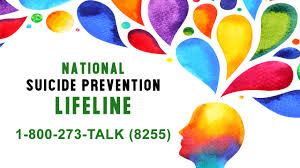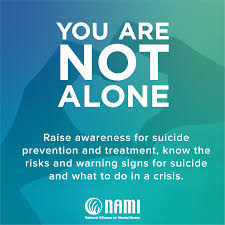
January 5 is a significant day in my life. Every year I reflect on my thoughts and feelings that led to my suicide attempt on January 5, 1984. Winter break had come to an end. I was in eighth grade and I remember dreading going back to school that Monday. I had been struggling with depression and contemplating suicide once I hit puberty. My home life was a mess and I did not fit in with the other kids. I could not understand why I hated myself and why the other kids; especially some of the boys who publicly ridiculed me. I wanted school to be my safety net. I looked to friends for respite from the problems I was facing at home.
When I got off the school bus that Monday after Christmas break I went into despair. I remember standing in the bathroom thinking, “This world would be better off without me.” This was a repetitive statement I would tell myself beginning around the age of ten. I never told anyone how hopeless I felt. I tried to reach out to teachers and other adults to let them know I was not okay. I was unable to verbalize the level of depression because I did not trust authority figures. I actually felt like I could get in trouble if I told someone I did not want to live anymore. At that time there was very little focus on an issues related to mental health disorders. Suicide was a taboo topic.
Before my suicide attempt I found ways to hold the urge to self-harm. I ate to comfort myself. I escaped into television shows about families with parents that cared about their children. I danced in my living room and had dreams of being on the Broadway stage. I did a ton of journaling. I wrote down the self-loathing thoughts in the hopes it would make me feel less alone. None of those coping strategies worked that day. I had decided I did not want to be alive anymore. I stood in front of the medicine cabinet for what felt like an eternity contemplating taking the bottle of over the counter pain medications. I felt hopeless. Minutes later I took a handful of pills. I remember feeling torn. “Should I call someone and ask for help or should I just wait until the medicine kicked in so I could be out of this emotional turmoil?” Thankfully, the part of me that wanted help dialed 911.
During the last several years I have learned a ton about suicidality and what made me attempt to take my life as a fourteen-year old. As I went through my recovery from childhood abuse I remembered several other times during my teens and early adulthood that I felt suicidal. Every year the date approaches I have flashbacks about what I felt before, during and after I took the pills when I was fourteen. Rather than get consumed with the sadness and grief, I try every year on this day to celebrate my life and being on earth. With the stressors associated with the COVID pandemic, mental health issues like depression and anxiety are spreading almost as quickly as the virus itself. I was not surprised to learn that in the last couple of months one in four young adults have thought about suicide. Ongoing triggers; such as the isolation, financial devastation and disruption in daily living have led many people down a path of hopelessness. (https://www.washingtonpost.com/health/2020/11/23/covid-pandemic-rise-suicides/)
Through the years I have met several patients with a history of suicide attempts. I have been counseling men and women in my South Jersey private practice for over 24 years. Most of my patients have survived some type of trauma, abuse, eating disorder or dysfunctional family life in childhood. During Covid-19 almost all of my patients are reporting are more loneliness, more isolation and hopelessness that life will never return to “normal.” Throughout the pandemic I have had patients who have lost immediate family members to the virus and others who have lost their jobs or businesses. I see many teenagers and young adults who have expressed feeling trapped in emotionally unsafe homes with parents or partners’.
I have talked with many colleagues during these last nine months about the intensity of loss and depression patients are reporting. Last week I spoke with a patient whose friend from childhood had just taken his life. She sobbed as she told me about his history with depression and earlier trauma. She did not understand why now he decided to give into the suicidal urges. She talked to me about his family and young kids he was leaving behind. I could feel my gut wrenching as she was telling me about her friend. It was like I was in two places at the same time. When we spoke the anniversary of my suicide attempt was looming. Unfortunately, I can understand on some level what made him take his life. When someone is suicidal they tell me things like, “No one will ever understand.” I felt the same way for many years. I have learned through my recovery and work as a therapist that many people understand what it feels like to want to give up. Not everyone considers suicide as an option. The sooner someone voices these feelings and thoughts, the less likely he or she will act on it!

Tips for People with Suicidal thoughts or feelings:
- Ask for help. Reach out to your local crisis center or reputable organizations that handle suicidality (Resources at end of this article).
- Do not judge yourself for having these types of thoughts.
- Think about what kind of support you need so you do not have to face these feelings alone. Find an online support group that handles depression or bipolar disorder.
- Write down all the people who love and support you, even if they do not understand what you are going through.
- Use creative outlets to express your pain; such as, writing, singing, art, yoga, pet therapy or knitting.
- Recognize that contemplating suicide is a thought and if you speak it to a therapist or someone that is trained in handling these feelings you can make a plan for safety.
- Validate that these feelings may be more active during the lockdown.
- When you feel hopeless, do something that makes you feel hopeful. Think about different people in your life that appreciate your strengths and gifts.
Warning Signs for Suicide: (https://www.helpguide.org/articles/suicide-prevention/suicide-prevention.htm)
Talking about suicide – Any talk about suicide, dying, or self-harm, such as “I wish I hadn’t been born,” “If I see you again…” and “I’d be better off dead.”
Seeking out lethal means – Seeking access to guns, pills, knives, or other objects that could be used in a suicide attempt.
Preoccupation with death – Unusual focus on death, dying, or violence. Writing poems or stories about death.
No hope for the future – Feelings of helplessness, hopelessness, and being trapped (“There’s no way out”). Belief that things will never get better or change.
Self-loathing, self-hatred – Feelings of worthlessness, guilt, shame, and self-hatred. Feeling like a burden (“Everyone would be better off without me”).
Getting affairs in order – Making out a will. Giving away prized possessions. Making arrangements for family members.
Saying goodbye – Unusual or unexpected visits or calls to family and friends. Saying goodbye to people as if they won’t be seen again.
Withdrawing from others – Withdrawing from friends and family. Increasing social isolation. Desire to be left alone.
Self-destructive behavior – Increased alcohol or drug use, reckless driving, unsafe sex. Taking unnecessary risks as if they have a “death wish.”
Sense of calm – A sudden sense of calm and happiness after being extremely depressed can mean that the person has made a decision to attempt suicide.
What Family Members and Friends Can do to Help Loved Ones:
- Listen without judgement
- Rather than argue with your loved one, try and find out what is causing him/her to feel this hopeless
- Give your loved one phone numbers of therapists or hotlines that can address the problem.
- Offer to go with them to a therapy session or sit with them while they call a hotline.
- Help to create a safety plan. Have phone numbers for suicide hotlines written down.
- Remove sharp objects, medications or anything that could be used for self-harm.
- Get support for yourself! It is scary to know someone you care about is struggling with self-destructive thoughts.
- If you do not live with someone struggling with suicidality touch base via phone. Know your limits as well. If you are dealing with mental health issues as well, take care of yourself firstJ
- Follow up with your loved one if they are prescribed medication for the depression. Do not be afraid to ask them if he/she is complying with taking medication.
- Encourage positive living that includes healthy eating, exercise and sleep.
Resources for Suicide Awareness and Prevention:

